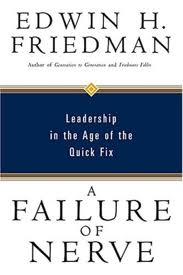Friedman’s Outline
One more Friedman post. Rich Bledsoe commented that the Biblical Covenant structure is very apparent in Friedman’s writings. Here’s a few of Mr Friedman’s principles for understanding the nature of true and false leadership (I have left quite a few of them out, as they wouldn’t make sense without his elaboration). For the whole outline, you’ll just have to get the book.
1 Society
- The characteristics of a chronically anxious family, organization, or society—reactivity, herding, blaming, a quick-fix mentality, lack of well-differentiated leadership—will always be descriptive of a regressed institution.
- When any institution, relationship, or society is imaginatively gridlocked, the underlying causes will always be emotional rather than cerebral.
- All pathogenic (that is, destructive) organisms, forces, and institutions, whether we are considering viruses, malignant cells, chronically troubling individuals, or totalitarian nations, lack self-regulation and are therefore invasive by nature and cannot be expected to learn from their experience.
- A major criterion for judging the anxiety level of any society is the loss of its capacity to be playful.
2 Relationships
- It is easier to be the least mature member of a highly mature system than the most mature member of a very immature system.
- Increasing one’s pain threshold for others helps them mature.
- Stress and burnout are relational rather than quantitative, and are due primarily to getting caught in a responsible position for others and their problems. [MB: In other words, it's not your workload, but the emotional nature of the burden that burns you out.]
- In any partnership, the more anxious you are to see that something is done, the less motivated your partner will be to take the lead.
- In any stuck relationship between and overadequate member and an underadequate other (person or organization), the overfunctioner must change before the underfunctioner can change.
- In any relationship anywhere, the partner doing the least amount of thinking about the other is the more attractive one to the other.
3 Self
- Trauma lies in the self-organizing quality of the system and the response of the organism rather that in the event. In other words, the trauma is in the experience and the response to it, not in the event itself.
- What is essential are stamina, resolve, remaining connected, the capacity for sef-regulation of reactivity, and having horizons beyond what one can actually see.
- There is no way out of a chronically painful condition except by being willing to go through a temporarily more acutely painful phase.
- Most of the decisions we make in life turn out to be right or wrong not because we were prescient, bu because of the way we function after we make the decision.
4 Leadership
- Mature leadership begins with the leader’s capacity to take responsibility for his or her own emotional being and destiny.
- Clearly-defined, non-anxious leadership promotes healthy differentiation throughout a system, while reactive, peace-at-all-costs, anxious leadership does the opposite.
- Differentiation in a leader will inevitably trigger sabotage from the least well-differentiated others in the system.
- The unmotivated are notoriously invulnerable to insight.
- People cannot hear you unless they are moving toward you, which means that as long as you are in a pursuing or rescuing position, your message will never catch up, no matter how eloquently or repeatedly you articulate your ideas.
- The children who work through the natural difficulties of growing up with the least amount of difficulty are those whose parents made them least important to their own salvation.



























August 2nd, 2011 at 12:09 am
These are so insightful I’m tempted to view them as similar to Proverbs (which slightly alarms me). Are these simply the musings of the author, or the results of research, or what exactly? (Sorry if you explained that in a previous post)
Also, re “Differentiation in a leader”, does he mean that the more specialized a leader is, the more he’ll be sabotaged by a generalist?
Thanks for sharing this.
August 2nd, 2011 at 12:16 am
Hi Dave
The author died before the book was finished, so they added his book outline/summary to the unfinished chapter. His observations are the result of many years of counseling, and working in various fields where he could see the same principles at work in all spheres of human life.
On self-differentiation, there’s a summary here:
http://www.academicleadership.org/article/The_Edwin_Friedman_Model_of_Family_Systems_Thinking (scroll down)
My little mind also had some thoughts here:
http://www.bullartistry.com.au/wp/2011/07/21/high-distinction/
August 3rd, 2011 at 9:39 pm
Mike,
You’ve quoted two Friedman books (Generation to Generation and this one). Which would you recommend most highly? I’m doing a discipleship group for aspiring pastors and think I might look at using one of these books. Have you read his fables book?
August 3rd, 2011 at 10:08 pm
Hi Joe
All my quotes have been from Failure of Nerve. From memory, Rich said Generation is better but more difficult. He also recommended I read the fables!